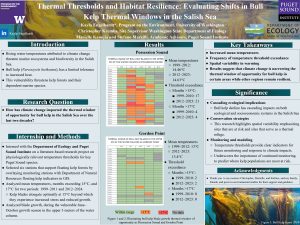Shifting Thermal Windows: The Impact of Climate Change on Bull Kelp in the Salish Sea
Climate change significantly alters marine thermal environments, substantially impacting species like bull kelp (Nereocystis luetkeana). In the Salish Sea, bull kelp forests provide critical habitats for culturally and ecologically important species, such as salmon. This study examines changes in bull kelp’s thermal window of opportunity over the past two decades by analyzing long-term temperature monitoring data from Puget Sound, paired with temperature thresholds identified during my internship with the Washington State Department of Ecology and the Puget Sound Institute. Temperature niche windows are crucial for marine species, as they define the specific thermal conditions required to sustain populations. Warming waters due to climate change can either contract or expand these windows, affecting species resilience. Bull kelp typically thrives within a thermal range of 9°C to 15°C, with optimal blade growth at 15°C. However, findings reveal a narrowing of this thermal window over the last decade due to more frequent occurrences of marine temperatures exceeding 15°C. For example, Dana Passage has experienced a 0.26°C rise in mean water temperature from 2012 to 2024, compared to 1999 to 2011. From 2012 to 2024, temperatures exceeded 15°C in 17 months, whereas only five months exceeded this threshold in the preceding period. This contraction of suitable thermal conditions for bull kelp threatens the productivity and biodiversity of coastal ecosystems, emphasizing the need for effective conservation strategies. Understanding these dynamics is essential to safeguarding the ecological and economic resilience of the Salish Sea.
